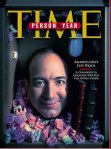Anniversaries, controversies for Amazon
Amazon.com, the company that that demonstrated the Web could be safe for commerce, marks two anniversaries this month, the 20th anniversary of its incorporation and the 19th anniversary of the opening of its online store.
![]() The occasions represent opportunities to ruminate about how far the company has traveled from its modest and mythical origins. And how controversy once was so seldom attached to Amazon.
The occasions represent opportunities to ruminate about how far the company has traveled from its modest and mythical origins. And how controversy once was so seldom attached to Amazon.
Almost no one noticed when Amazon — incorporated in July 1994 as Cadabra Inc. — started selling books at its Web site on July 16, 1995. As I note in my forthcoming book about that decisive year, the obscurity of its origins “seems in hindsight a bit astonishing, given how embedded Amazon has become in American life and culture.”
It is, tech writer Amy-Mae Elliott once wrote, “as much of a landmark on the web as the Eiffel Tower is to Paris.”
In fewer than 20 years, Amazon has become a ubiquitous, multibillion conglomerate with more than 115,000 fulltime and parttime employes worldwide. It is a retailing, e-reader, and Web services giant that has expanded far beyond books, those decidedly analog products that it first sold digitally.
Over the years, Amazon cultivated a founding myth of humble origins, that it took shape in a garage in Bellevue, a suburb of Seattle, Washington. The founding myth lives on, even though it really doesn’t much matter nowadays to a company that last year reported revenues of nearly $75 billion and is exploring such innovations as product delivery by unmanned drone.
But there’s a whiff of contrivance to Amazon’s founding myth.
The company’s founder-CEO, Jeff Bezos, has said that in starting the company, he looked for a house to rent that came with a garage — “in part because we wanted some of that garage-startup legitimacy” that attaches to companies such as Apple and Hewlett-Packard.
“It wasn’t full legitimacy,” Bezos conceded, “because the garage was enclosed,” and had been converted into a sort of work room. It was more an office than a garage, albeit a poorly heated one.
It wasn’t insulated, Bezos said, and “it was very cold, and that gave us some legitimacy.”
As Bezos has also said, by the time Amazon began selling books online in 1995, the company had taken up quarters in an industrial neighborhood in Seattle.
Nonetheless, the garage-startup myth has proved irresistible and some accounts over the years have said, erroneously, that Amazon sold its first books out of a garage. Time magazine, for example, declared in 2010 that when “Amazon.com opened for business on July 16, 1995, it was nothing more than a few people packing and shipping boxes of books from a two-car garage in Bellevue, Wash.”
 Time named Bezos its person of the year in 1999 (see left), and said then that Bezos “has done more than construct an online mall. He’s helped build the foundation of our future.”
Time named Bezos its person of the year in 1999 (see left), and said then that Bezos “has done more than construct an online mall. He’s helped build the foundation of our future.”
That characterization rather typified the laudatory media coverage that Bezos and Amazon received for many years — favorable publicity that can be traced to a glowing, front-page article in the Wall Street Journal in 1996, just 10 months after the company opened for business.
The Journal article introduced Amazon to tens of thousands of readers as “a singular case in which the frequently hyped Web is actually changing consumers’ lives.” The article promoted another quasi-myth of Amazon’s founding — that Bezos wrote the company’s business plan on a laptop computer while his wife drove their car West, to the Pacific Northwest. (The Time article in 2010 suggested the tenacity of that myth, saying that Bezos used “some of his time on the road [to Seattle] to write the company’s business plan.”)
The tendency toward laudatory publicity was never total, however. In 1997, Slate.com called it “Amazon.con” and disputed the company’s claim to be “Earth’s biggest bookstore.”
But Amazon for years was a media darling, in small part because it is one of the few Internet giants that is still run by an admittedly geeky yet colorful founder.
That shower of favorable publicity has let up somewhat in recent months, given news reports in Europe and the United States have described the demanding, sweatshop-like conditions at Amazon’s distribution centers. Moreover, Amazon has received sustained negative press in its battle with the book publisher Hachette. At issue, essentially, is how much revenue Amazon will keep from selling Hachette’s e-books.
The battle broke into the open several weeks ago and has led to Amazon’s taking sustained criticism of unprecedented proportion. Amazon, for example, clumsily sought an end-around Hachette by offering its authors 100 percent of the revenue from sales of their e-books on Amazon. The offer was rejected.
“Amazon is being killed by this author thing,” David Streitfeld, the New York Times technology reporter covering the Hachette dispute, said in an email to the Digital Book World blog. “It really bugs them. They are supposed to be the author’s friend.”
Meanwhile, Amazon’s entry last month into the smartphone market — it introduced a $199 phone (with contract) called Fire — has won few rave reviews. Paulo Santos, a mutual fund analyst and one of Amazon’s most persistent online critics, wrote that that “the most likely outcome is for the phone to be a dud given how absurdly mispriced it is.”
Santos added: “You can imagine that the customers buying the phone will at some point end up discovering that they’ve been had.”
The disputes and controversies make the company’s humble origins — and the reflexively flattering press it used to receive — seem very distant.
Amazon made its name selling books online but it’s engaged on multiple fronts now. John Rossman, a former Amazon executive, was quoted by Streitfeld in the Times the other day as saying:
“Amazon is fighting a five-front war. They are investing in faster delivery, in a phone, in streaming video. And they need more profits so they can continue their investments. That’s why there is a lot of pressure and negotiation.”
It’s a recipe no doubt for further controversy in Amazon’s 20th year.
More from The 1995 blog:


Pingback: Recalling the ‘coolness’ of the early Web |
Pingback: How important was Netscape? |
Pingback: Illuminating the Web: Netscape’s IPO of August 1995 |
Pingback: Lesson misunderstood: NATO’s 1995 bombing in Bosnia |
Pingback: Hype and hoopla in a watershed year: Launching Windows 95 |
Pingback: Ouster of WaPo publisher prompts reference to newspaper’s mythical role in Watergate | Media Myth Alert
Pingback: So. Africa case like the O.J. Simpson trial in 1995? Only marginally |
Pingback: Recalling the ’95 case against lecherous Bob Packwood, whom Biden praised yesterday |
Pingback: The inevitablity of O.J. Simpson’s acquittal in 1995 |
Pingback: The big gap in Monica Lewinsky’s speech |
Pingback: Five years on: The best of Media Myth Alert, Part II | Media Myth Alert
Pingback: It’s out: ’1995: The Year the Future Began’ |
Pingback: Looking back to 1995, the year the future began | The 1995 Blog
Pingback: Quirkiness on New Year’s, 1995: ‘Far Side’ farewell, errant Clinton prediction | The 1995 Blog
Pingback: Rolling out 1995 | The 1995 Blog
Pingback: Media fail: A 1995 subtext that’s familiar today | The 1995 Blog
Pingback: Watershed status of 1995 explored in book rollout at Newseum | The 1995 Blog
Pingback: Going ‘Majic’ for a brisk radio discussion about 1995 | The 1995 Blog
Pingback: ‘1995 was watershed moment in consumer technology,’ says Intel CEO | The 1995 Blog
Pingback: What ‘Time’ forgot in its look back to 1995 | The 1995 Blog
Pingback: Much tedium, little drama in CNN rehash of O.J. Simpson trial | The 1995 Blog
Pingback: Monica Lewinsky’s essay was solid: But award-winning? Probably not | The 1995 Blog
Pingback: O.J. and DNA: Applying the ‘Page 99 Test’ to ‘1995’ | The 1995 Blog
Pingback: Recalling the quaint early struggles to describe the Web | The 1995 Blog
Pingback: 20 years on: Recalling O.J.’s wretched bestseller | The 1995 Blog
Pingback: Part One: Highlights of ‘1995’ interview with Reason.com | The 1995 Blog
Pingback: Part Two: Interview takes up scandal and the ’90s ‘zeitgeist’ | The 1995 Blog
Pingback: ‘The Internet? Bah!’ Classic off-target essay appeared 20 years ago | The 1995 Blog
Pingback: ‘Calvin and Hobbes’ was best ended in 1995 | The 1995 Blog
Pingback: Talking Internet history, and 1995 | The 1995 Blog
Pingback: Saluting the unassuming wiki, 20 years after its launch | The 1995 Blog
Pingback: ‘The Internet Tidal Wave,’ 20 years on | The 1995 Blog
Pingback: Hinge moment at the O.J. ‘Trial of the Century’ | The 1995 Blog
Pingback: Microsoft warns Netscape in prelude to the ‘browser war’ of 1995-98 | The 1995 Blog
Pingback: The ‘cyberporn’ scare of 1995: Demonstrating the early Web’s corrective power | The 1995 Blog
Pingback: 1995 as tipping point: Recalling Smith Corona’s bankruptcy | The 1995 Blog
Pingback: Of space shuttles and love-sick woodpeckers, 1995 | The 1995 Blog
Pingback: 20 years after its launch, Amazon showing an unlikable side | The 1995 Blog
Pingback: What ‘Clueless’ at 20 can tell us about exploring the recent past | The 1995 Blog
Pingback: The ‘Netscape Moment,’ 20 years on | The 1995 Blog
Pingback: Dilemma on the Merc’s front page: Lead with Netscape? Jerry Garcia death? | The 1995 Blog
Pingback: Contrived ballyhoo: Recalling Microsoft’s rollout of Windows 95 | The 1995 Blog
Pingback: Downer doc: Richard Holbrooke recalled on HBO | The 1995 Blog
Pingback: Prediction of the year, 1995: Internet ‘will soon go spectacularly supernova’ | The 1995 Blog
Pingback: Remembering launch of Alta Vista, ‘a high-speed system for finding information’ on early Web | The 1995 Blog
Pingback: Christmas and cyberspace, 1995: Toe-dipping online | The 1995 Blog
Pingback: The ‘Netscape Moment,’ 21 years on | The 1995 Blog
Pingback: The 15 ‘most influential’ Web sites? A third of them date to 1995 | The 1995 Blog
Pingback: Why a ‘Clueless’ remake would be a terrible idea | The 1995 Blog
Pingback: When the Web was new: Remembering Netscape and its fall | The 1995 Blog
Pingback: Checking out ‘Captain Marvel’s over-the-top, 1995-throwback Web site | The 1995 Blog
Pingback: The 1995 Blog turns five: A look back at five top posts | The 1995 Blog
Pingback: With us still: 1995, 25 years on | The 1995 Blog
Pingback: 25 years on: Bill Gates’ ‘Internet Tidal Wave’ memo, a seminal document of the unfolding digital age | The 1995 Blog
Pingback: Memorable moment in an exceptional year: The Netscape IPO of 1995 | The 1995 Blog
Pingback: Looking back 25 years: Alta Vista and ‘high-speed’ search for the early Web | The 1995 Blog